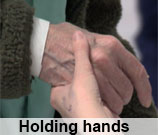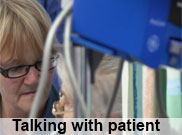Social Environment - Relationships
Patients with dementia often have poor outcomes, their general health may be deteriorating and they may have had to give up their home to live in a care home. Many are grieving for the loss of a long-term partner. They may be experiencing bewilderment, anxiety or distress. The social environment is about relationships. People with dementia need to feel comforted, have a sense of their own identity, feel attachment to others, have occupation and feel socially included. We must be understanding and provide a space to allow them to express their fears.
Problems such as memory loss and communication difficulties make it difficult to form and sustain relationships. So healthcare professionals need to be proactive, friendly and helpful, but without necessarily expecting anything in return (although people with dementia can still be very appreciative of kindness).



A healthcare professional introducing himself to patient by the bedside:
Correct - This gives the patient Identity.
Social etiquette is important to give a sense of the patient's own identity and importance.
A healthcare professional introducing himself to patient by the bedside:
Sorry this is incorrect - The corrrect answer is identity.
Social etiquette is important to give a sense of the patient's own identity and importance.
Holding Hands:
Correct - This gives the patient comfort and Attachment.
Hand holding - many patients, particularly those who are severely cognitively impaired get comfort and a sense of attachment from physical contact.
Holding Hands:
Correct - The corrrect answer is comfort and Attachment.
Hand holding - many patients, particularly those who are severely cognitively impaired get comfort and a sense of attachment from physical contact.
Talking with patient: Correct - it is important for staff to talk socially to patients and not just to restrict conversation to information gathering and imparting.
Talking with patient:
Sorry this is incorrect - The corrrect answer is Social Inclusion.
Talking with the Patient - it is important for staff to talk socially to patients and not just to restrict conversation to information gathering and imparting.